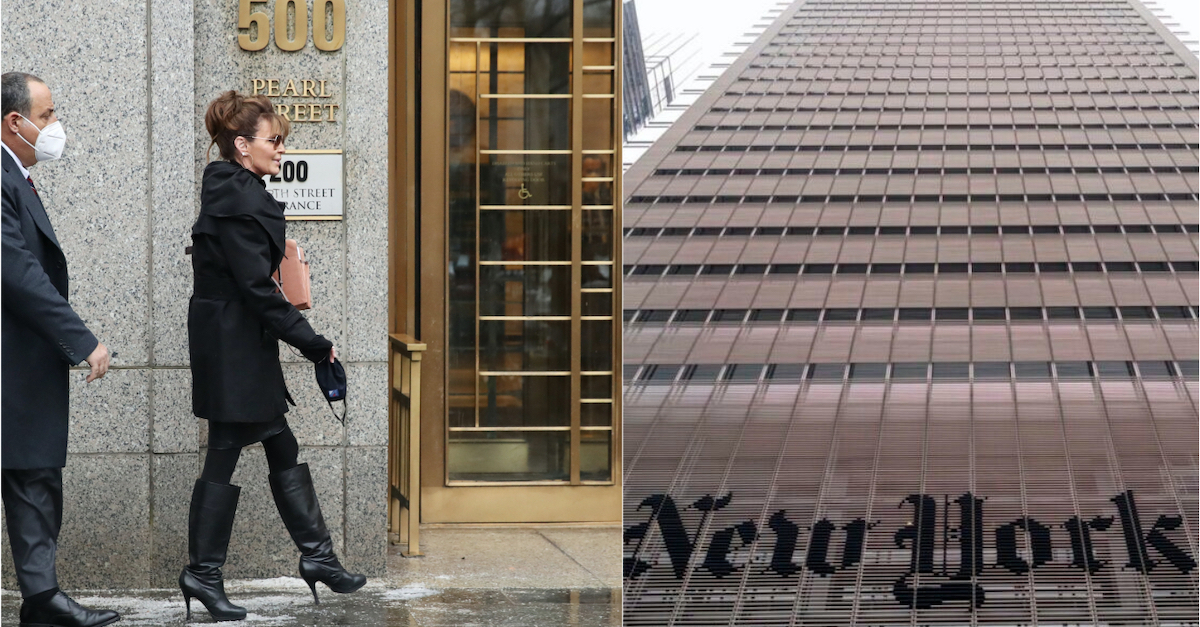
On the left, ex-Alaska Gov. Sarah Palin (R) enters into a Manhattan federal courthouse at 500 Pearl Street, where her lawsuit against the New York Times is taking place. The newspaper’s headquarters is on the right.
A little more than a week after it began, former Alaska Gov. Sarah Palin’s (R) defamation lawsuit against the New York Times headed to closing arguments on Friday, where attorneys for both sides appeared eager to play down the case’s political associations.
“The politics don’t matter,” Palin’s attorney Kenneth Turkel declared early in the summations.
Turkel was referring to the New York jury’s possible opinions in deliberating on the case of the tea party politician, but throughout his summation, he claimed that the Gray Lady smeared his client because the editors were “liberal.”
“It may define why things happened, why certain people were judged certain ways,” he added, referring to politics.
Times attorney David Axelrod noted that internal communications show the paper explicitly solicited criticism of both sides of the political aisle, and he pointedly noted that the full editorial starkly contradicted Turkel’s theory that the writers “hated” Palin.
“Read it,” Axelrod said. “Read the entire thing. Gov. Palin’s involvement in the editorial is almost a footnote.”
He added that the editorial, whose archived original can be accessed here, ends with “praising Donald Trump.”
“It’s About the Freedom of the Press”
A rare defamation case against the Times to reach a federal jury, Palin’s lawsuit over the Times‘s more than four-year-old column “America’s Lethal Politics” could have profound implications for press freedom, whether she wins or loses on a trial court level.
“This is an incredibly important case because it’s about the freedom of the press and it’s about the First Amendment,” Axelrod said.
Palin alleges that the paper defamed her by falsely claiming she incited the 2011 mass shooting by Jared Lee Loughner, who killed six people and injured 13, including Arizona Rep. Gabrielle Giffords (D).
Long before the editorial ran, Palin received a firestorm of criticism after the massacre because, months preceding it, her political action committee Sarah PAC disseminated a map with targets over Giffords’ district and those of 19 other Democrats. Loughner’s criminal proceedings never produced evidence that the killer was aware of the map.
For some 12 hours, the Times editorial asserted the “link to incitement was clear.” That line was inserted by the paper’s then-editorial division head James Bennet into the more careful draft provided to him by Elizabeth Williamson. Others inside the newsroom, like columnist Ross Douthat, alerted Bennet to the error. The editorial nixed that language the next morning with a lengthy correction.
“That’s what this case is about: It’s about an honest mistake,” Axelrod said.
Under defamation law, a public figure needs to show actual malice, and it is not enough to demonstrate an error was made. That high standard, from the Supreme Court case Times v. Sullivan, has given the paper an unbeaten record in fending off defamation suits for more than half a century.
“In This Country, We’re Allowed to Have Our Own Opinions”
When she testified on Thursday, Palin claimed the editorial revived a particularly painful period of her life. She said that she received death threats long before the Times editorial because of that false connection in the immediate wake of the Loughner shooting. She said some of those threats targeted her then-9-year-old daughter Piper, who was the same age at the time as one of Loughner’s victims: Christina-Taylor Green.
That controversy of old simmered for more than half a decade until another gunman James Hodgkinson opened fire in a 2017 congressional baseball shooting, injuring Rep. Steve Scalise (R-La.) and others.
As information emerged that Hodgkinson was a Bernie Sanders supporter who hated Donald Trump, the Times editorial board immediately began mulling the link about overheated political rhetoric and violence. Its then-editor James Bennet asked for examples of hate speech on the left that he said that he tended to associate with the political right.
“The narrative for this story is set,” Turkel said. “It’s not going to be a story of just gun control.”
During opening statements, Axelrod noted that the editorial knocked both Sanders and Palin, and he said that demonstrated: “This wasn’t a political hit job.”
For Turkel, it showed a different impulse.
“Let’s play the political scoreboard,” he thundered. “The left kills one, the right kills one. […] It’s absurd.”
Since trial began, several news outlets called the editorial a reckoning over what some media critics describe as “both sides” framing. The piece scrupulously took shots across the political spectrum and ended by applauding Trump’s statement after Scalise’s shooting: “We may have our differences, but we do well in times like these to remember that everyone who serves in our nation’s capital is here because, above all, they love our country.”
The Times attorney countered that, in the United States, Palin is free to disagree with the editorial’s approach.
“You can disagree with the theory, but that’s not defamation,” Axelrod told the jury. “In this country, we’re allowed to have our own opinions, and we argue about those opinions.”
If a jury finds the Times liable, they will have to determine what Palin deserves in compensation. Senior U.S. District Judge Jed Rakoff struck down her claim for punitive damages on Thursday, finding that her evidence of ill will by Bennet was “quite modest indeed.”
Axelrod went further: Evidence that Palin was damaged by the editorial was “zip, zero, zilch, none.”
Palin acknowledged that she continued to give paid speeches, make TV appearances, and go on the campaign trail after the editorial ran. The Times itself got the bulk of the criticism about the editorial, not her, their attorney noted.
(Photo of Palin via Spencer Platt/Getty Images; photo of NYT building via JOHANNES EISELE/AFP via Getty Images)